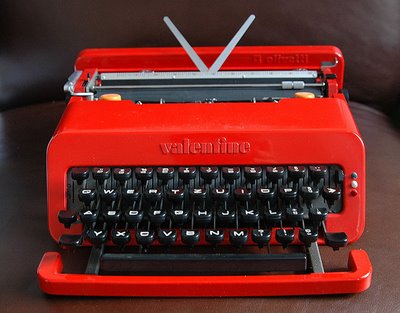 electronic typography; a real and current issue I agree. The author here seems to be considering the idea of a compromise of our beloved letterforms in relationship to the digital era of spoken word. I feel that her concerns, although well developed, are misplaced. For artists and philosphers pure in the world of typographic consideration such as Jacques Derrida, the advent of technological advancement must be a threatening idea. However, my thinking is that our society might consider the world of electronic type, written language, & spoken word are separate but equal. We use and manipulate each form in certain ways according to the audience and purpose. There are still as many relevant uses for the written language as there are for spoken word, as there are for a digitized mixture of the two. Recently, I have been exploring the use of animation software to be manipulated in the on-line classroom. Truly, typography and speech are the (two) backbone(s) for such programming. Now I realize that typographic techniques are not the basis for control in such a media however the basic concept still exists that the typographic language is necessary. And more importantly, although these technologies exist, people are still using and are in need of type as static imagry. I can imagine there might have been some (very little but still some) concern as letterforms were becoming more on the forefront of communication that personal interaction would be slightly compromised. Maybe this is just a blip in our constant evolution of language.
electronic typography; a real and current issue I agree. The author here seems to be considering the idea of a compromise of our beloved letterforms in relationship to the digital era of spoken word. I feel that her concerns, although well developed, are misplaced. For artists and philosphers pure in the world of typographic consideration such as Jacques Derrida, the advent of technological advancement must be a threatening idea. However, my thinking is that our society might consider the world of electronic type, written language, & spoken word are separate but equal. We use and manipulate each form in certain ways according to the audience and purpose. There are still as many relevant uses for the written language as there are for spoken word, as there are for a digitized mixture of the two. Recently, I have been exploring the use of animation software to be manipulated in the on-line classroom. Truly, typography and speech are the (two) backbone(s) for such programming. Now I realize that typographic techniques are not the basis for control in such a media however the basic concept still exists that the typographic language is necessary. And more importantly, although these technologies exist, people are still using and are in need of type as static imagry. I can imagine there might have been some (very little but still some) concern as letterforms were becoming more on the forefront of communication that personal interaction would be slightly compromised. Maybe this is just a blip in our constant evolution of language. On a separate note, the author mentions something about "...reconciling the relationship between words spoken and words seen..." This might be the key to not having to compromise our letterforms. Let's break down the barrier just a little bit more, and maybe spoken/written (powers combined) will generate enough ownership to users that digital media might back down, just enough anyway. "When written words can speak for themselves," isn't that what a reconcilation would sound like? Alright so maybe that's just type taking over, but why not? How can language similarly effect typography? I guess I just thought that was how.
In trying to keep this one shorter than the past few, with some complaints in length (George). Type is timeless. No doubt in my mind. We still use it will every intention as we use speech, and I think we even push it through its electronic form. No offense Jessica, Everything's Gonna Be Alright.

0 Comments:
Post a Comment
<< Home